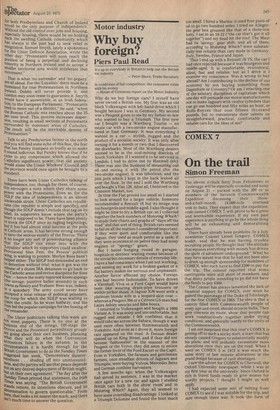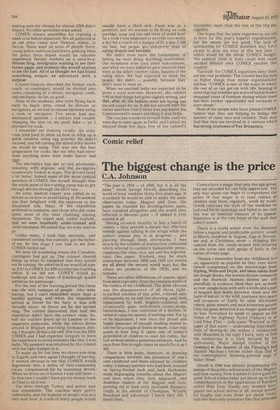COMEX 7
On the trail
Simon Freeman The eleven o'clock ferry from Felixstowe to Zeebrugge will be especially crowded and noisy on August 21 — packed with the 200 or so members of the Seventh Commonwealth
Expedition discussing their three and-a-half-month, 18,000-mile overland trek to India. They expect that the expedition, code-named COMEX 7, will, prove to be a great and worthwhile experience. If my own past experience is anything to go by the whole thing will be an exhausting , and demoralising shambles.
There have already been problems. In a July newsletter Colonel Lionel Gregory, COMEX leader, said that he was having trouble recruiting people. He thought that "the attitude that equates everything with moneylas driven the spirit of adventure underground." What he may have meant was that he had not been able to drum up enough sponsorship for members of COMEX, who each have to find £300 to pay for the trip. The colonel reported that some contingents were still short of members, and that many people intending to go did not have the funds to pay £300.
The Colonel has always lamented the lack of financial support for COMEX, ever since he gained the patronage of the Duke of Edinburgh for the first COMEX in 1965. The idea is that a convoy filled with Commonwealth people of every age and creed, should drive to India. They give concerts en route, show that people can work constructively together under trying conditions, and generally testify to the unity of the Commonwealth.
I am not surprised that this year's COMEX is getting off to such a sticky start, a start that has already caused Gregory to substantially modify his plans, and will probably necessitate more alterations once they are on the road. When I went on COMEX 5 in 1972 it was much the same story of last minute alterations in the grand design because of cash shortages.
I saw the advert for COMEX in Cherwell, the Oxford University newspaper, while I was in my first year at the university. Since Oxford is rich in travel funds ready to give money for worthy projects, I thought I might as well apply. I had expected some sort of vetting from COMEX to see if I was suitable for the trip, and sure enough there was. It took the form of making sure my cheque for almost £200 didn't bounce. No other questions were asked.
COMEX always assembles for training a week or so before departure. We all gathered at an old army camp near Newton Abbot, in Devon. There were all sorts of people there: young police cadets on paid leave, gaining what the police force hoped would be valuable experience; factory, workers on a once-in-alifetime fling; immigrants wanting to see their homes again; and students like myself anxious to see the East. All of us thought we had found something unique: an adventure with a purpose.
Colonel Gregory described the format: each coach, or contingent, would be divided into crews consisting of a driver, navigator, cook, and mechanic. So far, so good.
None of the students, who were flying back early to begin term, could be drivers or navigators, so we had to choose between being a cook or navigator. I've never had any mechanical aptitude — I always had trouble changing the tyre on my push bike — so I plumped for cook.
I remember my training vividly. An army cook tried hard to show us how to whip up a quick omelette using egg powder. He didn't succeed, and left cursing the dated army stoves we would be using. This was not the best preparation for cooks like me who had never done anything more than make bacon and eggs.
The mechanics had one or two afternoons tinkering with engines, and the navigators occasionally looked at maps. The drivers fared a lot better. Indeed some of the more cynical members of COMEX, like myself, thought that the whole point of the training camp was to get /enough drivers through the HGV test.
An army medical expert was called in to lecture us on how to avoid falling ill. He seemed less than delighted with the response to his illustrated talk. Many of the expedition preferred to sunbathe, and those who did come spent most of the time chatting among themselves. The expert said, rather ruefully, that we were hopelessly under-trained and under-equipped. He added that we were mad to go.
Unlike many, I took him seriously, and considered leaving; but curiosity got the better of me. By this stage I just had to see how COMEX turned out.
We were all wondering where the Canadian contingent had got to. The colonel cleared things up when he explained that they would, not be coming. He asked us if we would all sign an IOU 63 COMEX for £20 to cover the resulting deficit. If we did not, COMEX would go bankrupt and the Duke of \ Edinburgh would withdraw his patronage.
For the rest of the training :period the camp was rife with rumours of people who were leaving, but I can't remember more than a handful quitting, and when the expedition arrived at Dover for the ferry it was still virtually intact. At Dover we hit the second snag. The colonel discovered that half the expedition didn't have the correct visas. So, half the coaches drove up to London to the respective embassies, while the others drove around in Belgium practising formation driving. I thought all this a bit odd: this was the fifth COMEX and I had expected Gregory to have the experience to avoid mistakes like this. I was lucky. My passport was returned by the colonel with the right stamps-on it.
To make up for lost time we drove non-stop to Zagreb, and once again I thought of leaving. It seemed obvious to me that COMEX would degenerate into a series of time-consuming errors, compensated for by marathon drives. When we drove on to Greece I was still there — by that time I couldn't have got my money back so I had to sit it out.
The drive through Turkey and points east was remarkable. The coaches were pretty unbearable, and the humour of people was at a very sour level. A coach of thirty people would usually have a third sick. Food was at a premium, and we seemed to be living on cold porridge, soup and the odd treat of dried beef. As a cook I was supposed to provide two meals a day for a coach on a budget of -El a day. I did my best, but people got extremely tired of eating chupati and bananas.
We didn't even have the consolation of feeling we were doing anything worthwhile. Our receptions were cool, often non-existent, and when we were asked to give concerts they were at the select country clubs, haunts of the ruling elites. We had expected to meet the people. We didn't — possibly because they didn't want to meet us.
When we reached India we expected to be given a royal welcome. However, the colonel told us that things had gone slightly wrong, and that, after all, the Indians were not laying out the red carpet for us. It did not accord with his earlier assertion that it there was anywhere the Commonwealth meant anything it was India.
The coaches wandered around India until we were due to meet again in Delhi, and I admit we enjoyed those few days, free of the colonel's timetables, more than the rest of the trip put together. One hopes that the same experiences are not in store for this year's hopeful expeditioners, but the omens are not good. The lack of sponsorship for COMEX members may force people to drop out even at this late date — which would hit the whole COMEX budget. The political crisis in India could well cauSe another debacle once COMEX reaches that country.
Naturally the COMEX organisers deny there are any real problems. The colonel has his eyes on higher things than minor organisational hitches: "COMEX is one of the ways in which the rest of us can get on with life, bearing in mind that our troubles are scars of battle from a thousand years of freedom during which there has been neither opportunity nor occasion to start afresh."
Most of the people who have joined COMEX believe that they are helping to bridge the barriers of class, race and country. They may find that they are involved in a venture which has strong overtones of Pax Britannica.



































 Previous page
Previous page